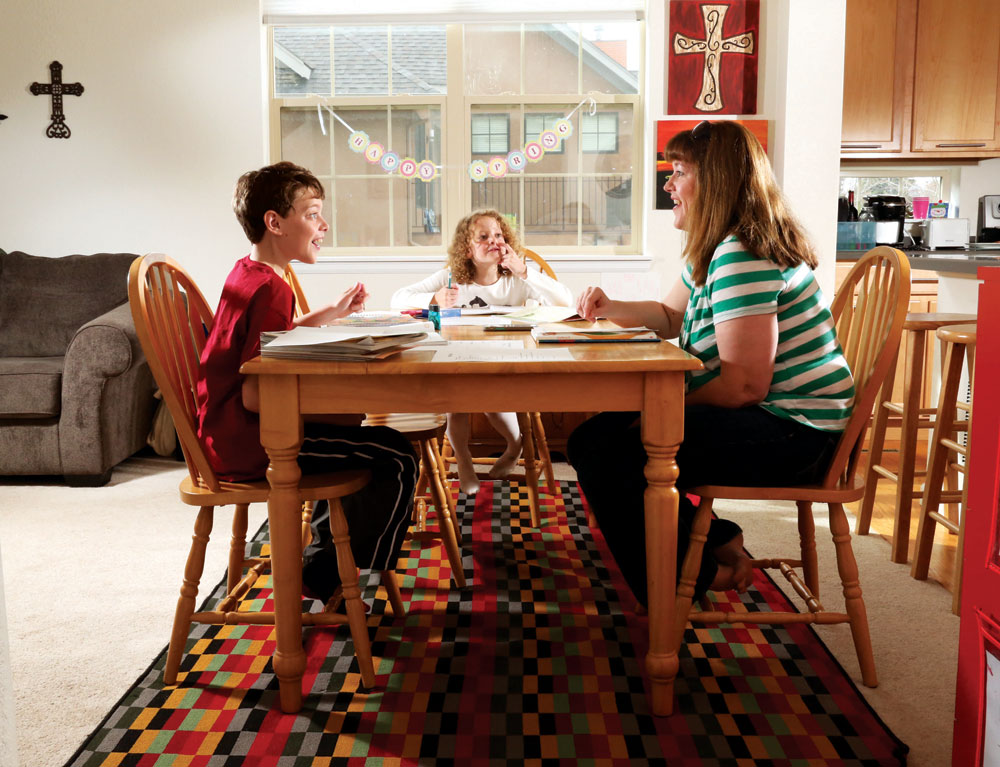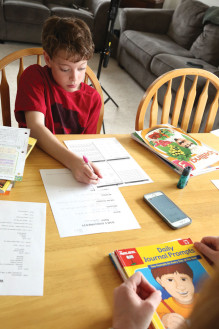
Amanda Sanford home schools her two children Alex, 11, and Reagan, 8. Sanford chose to home school when Alex was languishing in a kindergarten classroom where his individual needs were not being adequately met.
 As thousands of Denverites await the results of the school choice lottery, a handful of parents reviewed their options and chose none of the above. These families are in a small minority who have opted to homeschool their children.
As thousands of Denverites await the results of the school choice lottery, a handful of parents reviewed their options and chose none of the above. These families are in a small minority who have opted to homeschool their children.
“I wasn’t planning on homeschooling, but I knew full-day kindergarten wouldn’t work for my daughter,” Clea Edelblute said. “None of the schools I looked at felt like a good fit.”
“It wasn’t something we planned on doing,” Heather Thornton said of homeschooling her son. But after an idyllic preschool experience, Thornton faced the prospect of enrolling her son in a low-performing public school in Texas, where her family was living at the time. Instead, she decided to try to replicate at home what had worked at the preschool. “We gave it a shot, it worked beautifully, he thrived, and we never looked back,” she said.
Amanda Sanford found herself in a similar situation, where her son had a positive preschool experience, but was languishing in a kindergarten classroom where his individual needs were not being adequately met.
“He seemed underchallenged his first semester (in kindergarten),” Sanford said. “We made the decision to homeschool him and challenge him for the second semester. We fully intended to re-enroll him the following fall for first grade.” But instead, the Sanfords discovered that homeschooling “was a great match for our family,” and they have done it ever since.
Many homeschooling families say that once they stepped away from the public education model, they discovered an approach that allowed them to tailor curriculums and content to meet their children’s individual needs.
“Our society is used to school,” Edelblute said. “We take school and its pros and cons for granted. But once a person steps out of the school model—five days a week with a set teacher, set curriculum, desks, government accountability—and focus on learning, it’s very freeing.”
The home, said Thornton, is “a school with a 1:1 student teacher ratio, where the teacher knows the child completely and cares about his well-being above all.” She noted that homeschooling allows her to incorporate experiential learning into her son’s education. In the course of about a week, she and her son “visited the zoo, saw the local Matisse exhibit, attended music lessons, and enjoyed an incredible live lecture by Dr. Neil DeGrasse Tyson.”
“We make sure everything our child needs is accessible to him, and if my child is really enjoying learning about a particular subject, we can devote more time to it,” Thornton added.
“So much individual instruction and attention for each child helps them excel,” Sanford agreed, noting that homeschoolers are able to “move forward at a quicker pace once a skill is mastered” and slow down to spend more time on challenging skills.
Sanford, who has a master’s degree in early childhood special education, finds that her background as an educator has helped her make decisions about which curricula to use for her children.
“Both of our children have ADHD and I am able to modify our day as needed, in order to help them reach their fullest potential. We adhere to a routine, but appreciate some flexibility as well,” she noted, repeating a common refrain among homeschooling families that the ability to tailor the school day and curriculum to fit their children is liberating.
While homeschoolers have wide latitude in choosing curriculum and content, the Colorado Department of Education does have some guidelines in place for homeschooling families. For example, homeschooled children must have a minimum of 172 school days per year, must take standardized tests in 3rd, 5th, 7th, 9th and 11th grades, and must learn reading, writing, math, history, civics, literature and a regular course of instruction on the Constitution of the United States. If homeschooled children do not score above the 13th percentile on standardized tests, they are required to attend public or parochial schools until the next testing period.

Amanda Sanford thoughtfully plans out creative lessons for her children, including a lesson for Pi Day.
Homeschooling families in Denver are required to register with their neighborhood DPS school. As of October 2014, there were only 262 students in grades K-12 registered as homeschoolers in Denver, according to the district’s official statistics. To put that number in context, there were 90,150 K-12 students enrolled in DPS schools, with thousands more attending local private schools.
Unlike in some states and localities, the financial burden of curriculum development, books and materials is entirely assumed by the homeschooling family, without monetary support from the state or many local school districts, including DPS. However, many homeschooling families, including those in Denver, participate in the Aurora Public Schools “Options” program, which provides curriculum support for homeschooling families who enroll their children in the school for five to six hours per week. Many homeschooling families with older children take advantage of the program to allow access to science labs, foreign language instruction, standardized testing, and group sports.
Homeschooling parents confessed that there were some difficulties to homeschooling their children.
“Sometimes mom needs a break and it’s hard for me to get that,” Edelblute said, though she added that her supportive family has helped her achieve more balance in that regard. Thornton expressed a similar sentiment. “I rarely get time to myself,” she said, “but to me, it is most definitely worth it.”
Another frequently cited frustration is society’s perception of homeschoolers. Sanford said she feels like “(we) have to convince others that even though we school at home, we have high expectations and state requirements to meet.” Edelblute agreed, explaining that non-homeschooling families “often don’t understand homeschooling and ask the same tired questions about socializing, learning, spending ‘too much’ time together.”
Many homeschoolers seemed particularly frustrated by the assumption that their children are unsocialized or lack opportunities to play sports.
“The concern we hear most often, for our family and other homeschooling families, is that of socialization,” Sanford said. Yet the reality, she said, is quite different from the perception: “Our children participate in many circles outside of our home and are well-socialized and make friends easily. Each of our kids plays sports through city leagues as well as explores the arts through group and individual instruction. We are also active in church and our children have friends there, as well as around our neighborhood.”
“We can do private programs like the summer drama workshops or soccer at Bladium, or we can band together with other homeschoolers to create something less formal,” Edelblute said.
In Thornton’s words, “Homeschoolers have friends of varying age groups, genders, and geographic locations and can function in any situation, just as public school veterans can. Homeschoolers are socialized and experienced in the real world.”
Some homeschoolers are motivated in part by the freedom to incorporate religion into their everyday curriculum.
“We also have strong faith in God and love being able to incorporate biblical teaching into our curriculum, without the cost of private, Christian school tuition,” Sanford said.
Others, however, say religion plays no role in their decision. Homeschoolers are by no means a homogenous group.
“We’re not all homeschooling for religious reasons,” Thornton said, adding that religion was not a motivating factor for her family or the others she knows. Instead, she cited “family time, individualized education, and the opportunity to do things on our own timetable/schedule” as her family’s three primary motivations for their choice.
“We don’t think homeschooling is the best answer for all,” Thornton added. “We don’t think we have or do something better than everyone else. We think we’re doing what is best for our family.”
Edelblute agreed. “Homeschooling is just a different choice for learning,” she said. “It’s not about hating schools or thinking I am so much better than the system; it’s about meeting the individual needs of my family in a way that works.”




0 Comments